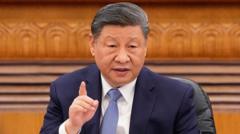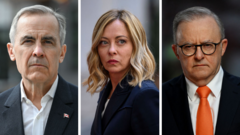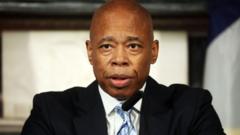Rubio’s NATO visit highlights concerns over President Trump's controversial foreign policy stance, particularly regarding Ukraine and Europe, amidst shifting relations.**
NATO Leaders on Edge as Rubio Visits Amid Trump’s Uncertain Foreign Policy**

NATO Leaders on Edge as Rubio Visits Amid Trump’s Uncertain Foreign Policy**
Secretary of State Marco Rubio's appearance at NATO raises alarms among European officials about Trump's approach to the Ukraine conflict and relations with Russia.**
In a critical visit to Brussels, Secretary of State Marco Rubio attended a NATO foreign ministers gathering, highlighting rising tensions regarding the Trump administration's foreign policy outlook. The meeting comes at a crucial time when European leaders express deep-seated worry over President Trump's approach to the ongoing war in Ukraine and escalating trade disputes with the continent. This is the first visit by a senior official from Trump's administration this year, marking a departure from the successful diplomatic engagements seen during President Biden's tenure.
Rubio's enduring pro-NATO stance indicates that he may be an essential voice in alleviating fears about Trump's unilateral inclinations, especially thoughts about reducing the U.S. commitment to NATO – a subject that has alarmed many partner nations who equate this with appeasement of Russian interests. The Secretary's attendance is viewed as a chance for dialogue, with officials hoping Rubio can project stability amid a shift towards discord between the United States and its European allies.
Historically, Rubio has stood in favor of deepening alliances, previously advocating for Senate approval on potential presidential withdrawals from NATO. In stark contrast, previous conversations with Trump reveal a president influenced by an isolationist narrative, where concerns around America being taken advantage of economically by Europe surface repeatedly. Despite Rubio's strategic conversations aimed at bridging gaps, concern lingers whether he can genuinely represent the sentiments of an administration often viewed as difficult to reconcile with traditional diplomatic norms.
Rubio's enduring pro-NATO stance indicates that he may be an essential voice in alleviating fears about Trump's unilateral inclinations, especially thoughts about reducing the U.S. commitment to NATO – a subject that has alarmed many partner nations who equate this with appeasement of Russian interests. The Secretary's attendance is viewed as a chance for dialogue, with officials hoping Rubio can project stability amid a shift towards discord between the United States and its European allies.
Historically, Rubio has stood in favor of deepening alliances, previously advocating for Senate approval on potential presidential withdrawals from NATO. In stark contrast, previous conversations with Trump reveal a president influenced by an isolationist narrative, where concerns around America being taken advantage of economically by Europe surface repeatedly. Despite Rubio's strategic conversations aimed at bridging gaps, concern lingers whether he can genuinely represent the sentiments of an administration often viewed as difficult to reconcile with traditional diplomatic norms.





















